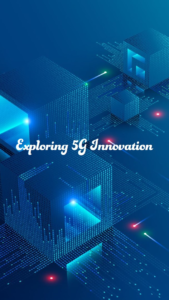5G vs 4G: The Future of Mobile Connectivity and What It Means for You
As mobile technology evolves rapidly, the introduction of 5G has stirred a lot of excitement and curiosity. But what exactly is 5G? How does it compare to 4G, and will it revolutionize your mobile experience? In this article, we’ll explore the differences between 5G and 4G, what 5G means for the future, and address some common questions about its potential.

What is 5G Technology?
5G, the fifth generation of mobile networks, is designed to provide much faster speeds, lower latency, and more reliable connections than its predecessor, 4G. While 4G revolutionized mobile broadband, allowing us to stream videos and play online games smoothly, 5G takes it several steps further, enabling new experiences such as virtual reality (VR), augmented reality (AR), and the expansion of smart cities and Internet of Things (IoT) devices.
Key Differences Between 4G and 5G
Here are the major differences between 4G and 5G:
1. Speed:
4G offers speeds up to 100 Mbps.
5G can potentially offer speeds up to 10 Gbps, allowing you to download large files and stream ultra-high-definition content in seconds.
2. Latency:
4G networks typically have a latency of 30-50 milliseconds.
5G reduces this to as low as 1 millisecond, offering real-time communication, essential for autonomous vehicles and gaming.
3. Capacity:
4G can handle a large number of connected devices, but 5G exponentially increases the number of devices that can connect without slowing down the network. This is particularly useful for smart homes and IoT devices.
4. Energy Efficiency:
5G uses less energy compared to 4G, which helps extend battery life on devices and promotes more efficient power usage in smart city infrastructure
How Will 5G Impact Mobile Connectivity?
1. Enhanced Mobile Experience:
With blazing fast speeds and near-zero latency, 5G will revolutionize how we use our phones. Streaming 4K videos, playing cloud-based games, and downloading apps will become instantaneous.
2. Mobile Gaming:
Gamers will be one of the biggest beneficiaries of 5G. The ultra-low latency of 5G ensures smoother online gaming experiences, making lag a thing of the past. It will also open up possibilities for more immersive games using AR and VR.
3. Smart Cities and IoT:
5G will be a backbone for the Internet of Things, connecting millions of devices in real-time. Smart homes, connected cars, and intelligent infrastructure are all part of this future. For instance, autonomous cars will rely on 5G for instant communication with traffic systems and other vehicles.
4. Remote Work and Education:
The global shift to remote work and education will get a significant boost with 5G. The faster speeds and improved connectivity will make virtual meetings, online courses, and cloud-based collaboration more efficient and seamless.
Common Concerns About 5G
Will 5G Replace Wi-Fi?
5G is designed to work alongside Wi-Fi rather than replace it. While 5G provides greater mobility and coverage, Wi-Fi is still an affordable and reliable option for home and office use. However, for public places like stadiums and transportation hubs, 5G may become the go-to option due to its higher capacity and speed.
5G Health Concerns
There has been some misinformation circulating about potential health risks from 5G. However, research from health organizations, including the World Health Organization (WHO), shows no confirmed evidence that 5G poses any new risks compared to previous generations of mobile networks.
When Will 5G Be Available in My Area?
5G rollouts are happening at different speeds around the world. While major cities already have some 5G coverage, rural areas may take a bit longer. To check availability in your region, most network providers offer a 5G coverage map online.
Looking Beyond 5G: What’s Next?
While we’re just starting to experience the benefits of 5G, technology never stops evolving. Researchers are already working on 6G, which is expected to bring even faster speeds, more advanced AI integrations, and better support for IoT devices. Though it is still in the early stages, 6G may begin rolling out around 2030, pushing the boundaries of mobile connectivity even further.
Conclusion: Is 5G Worth the Hype?
In summary, 5G is not just an upgrade from 4G—it’s a transformative technology that will change the way we live, work, and interact with the digital world. While it may take a few more years for 5G to reach its full potential, the future of mobile connectivity looks promising, with faster speeds, lower latency, and new possibilities in every sector.
If you’re considering upgrading to a 5G phone, now is a great time to dive into the future of mobile tech. Phonevibehub.com
October 24, 2024
No Comments
October 23, 2024
No Comments
September 30, 2024
No Comments
September 30, 2024
No Comments
September 30, 2024
No Comments